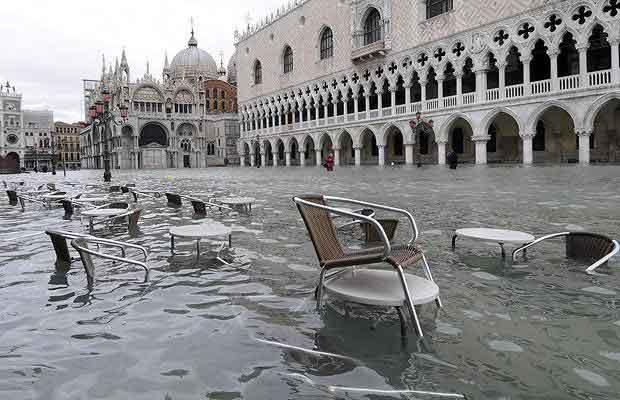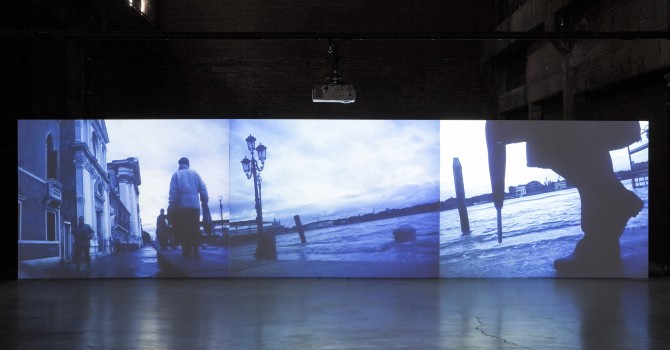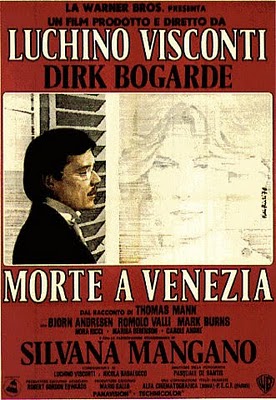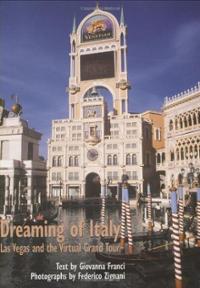
The Allegory of the Wave
The heuretic project is to do for Electracy what Plato did for Literacy. The exercise is to propose a "text" to function as an allegory of our metaphysics, the way the Allegory of the Cave functioned in Plato's oeuvre. The proposed (found) electrate allegory is by Jana Sterbak.
Jana Sterbak
Ours is a found allegory. We take no credit for it, but appropriate it from the video installation, based on one created for the Canadian exposition at the Venice Biennale (2003), made with Stanley the dog. Sterbak gained international recognition with her Flesh Dress (a dress made of meat). Franc Fernandez, who designed the meat dress worn by Lady Gaga in 2010, must have gotten the idea from Sterbak? The Canadian installation was entitled "From Here to There." She fitted her Jack russell Terrier puppy, Stanley, with a miniature video camera (attached to his head), then took him for a walk at two locations: a trail along the St. Lawrence River in Canada; Venice in winter. In this first version Stanley was allowed to explore on his own. The original idea to have Stanley play guide animal to the blindfolded artist was abandoned. The low POV shot recorded whatever attracted the terrier's attention, which had everything to do with smell and nothing to do with tourism or history. The footage was heavily treated in post-production. Waiting for High Water is the title of a sequel, 2004, a French exhibition. Stanley, this time with three head-mounted mini-cams, was walked on a leash during the winter "acqua alta" period in Venice. The exhibition included a catalog contribution by Hubert Damisch.
Waiting for High Water
Video excerpts
Archives
Installation
Exhibition
Apparatus Package
The Allegory of the Cave is a mise-en-abyme (miniaturization) embedded within an expanding series of settings that must also be invented. The Allegory of the Wave functions as the device that in Shakespeare's Hamlet is called "the mouse trap" -- the play presented to the King performing the murder scene as the ghost described it to Hamlet, to probe for guilt. The challenge is to construct the correspondences, from the microcosm to the macrocosm, to provide for ourselves a guide for electrate justice, and beyond that, to the new thinking, doing, and making relevant to all the virtues of global citizenship.

Share this
Comments

The Emblem City
Venice Image-Sign (Pasolini): a feature of the lifeworld appropriated as a sign (semantic aura). What may Venice express?

1
The Quarry
Invisible Cities
"Dawn had broken when he said: ‘Sire, now I have told you about all the cities I know.’
‘There is still one of which you never speak.’
Marco Polo bowed his head.
‘Venice,’ the Khan said.
Marco smiled. ‘What else do you believe I have been talking to you about?’
The emperor did not turn a hair. ‘And yet I have never heard you mention that name.’
And Polo said: ‘Every time I describe a city I am saying something about Venice.’
‘When I ask you about other cities, I want to hear about them. And about Venice, when I ask you about Venice.’
‘To distinguish the other cities’ qualities, I must speak of a first city that remains implicit. For me it is Venice.’
‘You should then begin each tale of your travels from the departure, describing Venice as it is, all of it, not omitting anything you remember of it.’
The lake’s surface was barely wrinkled; the copper reflection of the ancient palace of the Sung was shattered into sparkling glints like floating leaves.
‘Memory’s images, once they are fixed in words, are erased,’ Polo said. ‘Perhaps I am afraid of losing Venice all at once, if I speak of it. Or perhaps, speaking of other cities, I have already lost it, little by little.’"
 3
3
Jeanette Winterson
4
Joseph Brodsky
Watermark
"Should the world be designated a genre, its main stylistic device would no doubt be water. If that doesn't happen, it is either because the Almighty, too, doesn't seem to have much in the way of alternative, or because a thought itself possesses a water pattern. . . . This city takes one's breath away in every weather, the variety of which, at any rate, is somewhat limited. And if we are indeed partly synonymous with water, which is fully synonymous with time, then one's sentiment toward this place improves the future, contributes to that Adriatic or Atlantic of time which stores our reflections for when we are long gone. One of them, as out of frayed sepia pictures, time will perhaps be able to fashion, in a collage-like manner, a version of the future better than it would be without them. This way one is a Venetian by definition, because out there, in its equivalent of the Adriatic or Atlantic or Baltic, time-alias-water crochets or weaves our reflections--alias love for this place--into unrepeatable patterns, much like the withered old women dressed in black all over this littoral's islands, forever absorbed in their eye-wrecking lacework."
Marcel Proust
Time Regained
"Revolving the gloomy thoughts which I have just recorded, I had entered the courtyard of the Guermantes mansion and in my absent-minded state I had failed to see a car which was coming towards me; the chauffeur gave a shout and I just had time to step out of the way, but as I moved sharply backwards I tripped against the uneven paving-stones in front of the coach-house. And at the moment when, recovering my balance, I put my foot on a stone which was slightly lower than its neighbor, all my discouragement vanished and in its place was that same happiness which at various epochs of my life had been given to me by the sight of trees which I had thought I recognised in the course of a drive near Balbec, by the sight of the twin steeples of Martinville, by the flavour of a madeleine dipped in tea, and by all those last works of Vinteuil had seemed to me to combine the quintessential character. Just as, at the moment when I tasted the madeleine, all anxiety about the future, all intellectual doubts had disappeared, so now those that a few seconds ago had been given to me by the sight of trees which I had thought I recognised in the course of a drive near Balbec, by the sight of the twin steeples of Martinville, by the flavour of a madeleine dipped in tea, and by all those last works of Vinteuil had seemed to me to combine the quintessential character. Just as, at the moment when I tasted the madeleine, all anxiety about the future, all intellectual doubts had disappeared, so now those that a few seconds ago had assailed me on the subject of the reality of my literary gifts, the reality even of literature, were removed as if by magic.…Every time that I merely repeated this physical movement, I achieved nothing; but if I succeeded, forgetting the Guermantes party, in recapturing what I had felt when I first placed my feet on the ground in this way, again the dazzling and indistinct vision fluttered near me, as if to say: “Seize me as I pass if you can, and try to solve the riddle of happiness which I set you.” and almost at once I recognised the vision: it was Venice, of which my efforts to describe it and the supposed snapshots taken by my memory had never told me anything, but which the sensation which I had once experienced as I stood upon the two uneven stones in the baptistery of St Marks’s had , recurring a moment ago, restored to me complete with all the other sensations linked on that day to that particular sensation, all of which had been waiting in their place–from which with imperious suddenness a chance happening had caused them to emerge–in the series of forgotten days." (VI,255-256)
